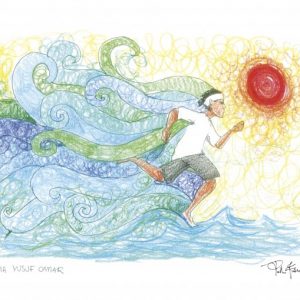Welcoming the Stranger Series
In the last ten years more than 35,000 asylum seekers have died in the Mediterranean. Desperate to escape untenable situations in countries like, Syria, Eritrea, Sudan, and Somalia, refugees risk both life and livelihood to board rickety boats bound for what they hope will be a new life in Europe. Many of them die within sight of what they hoped would be the promised land.
Welcoming the Stranger is a devotional series designed to help Christians connect this unfolding humanitarian crisis in the Mediterranean with the Bible’s call to “welcome the stranger.” Recognizing that “the stranger” can sometimes be an abstraction that blinds us to the face of Christ, the series approaches the refugee crisis from a personal perspective. Each entry focuses on one person’s story, brought vividly to life by Italian artist and relief worker, Francesco Piobbichi. These stories are then linked to relevant Scripture, prayer, discussion, and action prompts.
Immigration is a hot topic around the globe, and the Bible passages in this series speak to wherever we are called to “welcome the stranger.” My specific interest in the Mediterranean context was sparked by a 2016 trip to the island of Lampedusa—a small island off the coast of Sicily that is the scene of so much hope and tragedy for refugees trying to enter Europe via small, unsafe boats. In addition learning about the situation there and the work being done by ecumenical groups like Mediterranean Hope, I spent significant time interviewing Francesco Piobbichi, whose art documents the stories of individual refugees and families who often die trying to reach safety. You can learn more about him and work through the following link: Francesco Piobbichi’s Artwork Each of his “snapshots” tells a story—sometimes of triumph, but often of tragedy: Piobbichi’s goal is to help people understand this large-scale human tragedy on a more personal level. My goal in this series is to use Piobbichi’s art as a starting point for Bible study and personal reflection/action.

Samia’s Story:
Only God knows the names of all the people who have sought the relative safety of Lampedusa’s shores. But we know the name of the woman in this picture. It is Samia Usuf Omar. She was a sprinter for Somalia in the 2008 Beijing Olympics. When she returned to Somalia after competing in the Olympics, she found herself in an increasingly dangerous and restrictive situation. So, in October of 2010 she began the journey she hoped would take her to Europe, a new coach, and a chance at the 2012 Olympics. In October of 2012 her overcrowded boat ran out of gas. She drowned within sight of the rescue boat. The only reason we know about her is because another Samali athlete, gold medalist Abdi Bile, told her story.
Bible Reading: Ruth 4:11-18 (NRSV)
Ruth was a refugee. She fled famine with her mother-in-law, Naomi, and struggled to find acceptance in Naomi’s home town of Bethlehem. As a foreigner, a widow, and a recent convert to her mother-in-law’s faith, Ruth exists on the margins of the community of which she longs to become a part. In this passage from the end of the book that bears her name, we see the community finally returning her embrace. Instead of “Ruth, the Moabite,” she is here named with the matriarchs, Rachel and Leah. In the genealogies that follow, we realize that she is the great-grandmother of King David.
Ruth’s story reminds us that “foreigners” have had a crucial role to play in God’s story of salvation. It prompts us to remember that every refugee has a name and a story that is known to God even if it is not known to us. It makes us wonder about how the gifts and hopes of those who have died might have changed our world for the better. Finally, it nudges us to open our hearts, our minds, and our homes to people who we perceive to be different from ourselves.
Discussion/Reflection:
- How does knowing that Samia’s name and story affect your image of what it means to be a refugee?
- How might our response to the refugee crisis change if we knew the names and stories of the people involved?
Action:
- Read more about Samia’s story: BBC News Story re Samia
- Watch this tribute to Samia by Citius Altius Fortius: Tribute to Samia Yusuf Omar (1991-2012)
- Share a smile, a conversation, or a meal with someone who takes you out of your comfort zone.
Prayer: Gracious God, to you all your children by name. We lift before you all the people who risk their lives to find safety on distant shores. Even if they are anonymous to us, they are known and loved by you. We pray, especially, that Samia’s story may inspire others. May it help us to revise our assumptions and check our stereotypes. Comfort all those who grieve for those the world has forgotten, but whose love and legacy will always be a part of those they have left behind.
